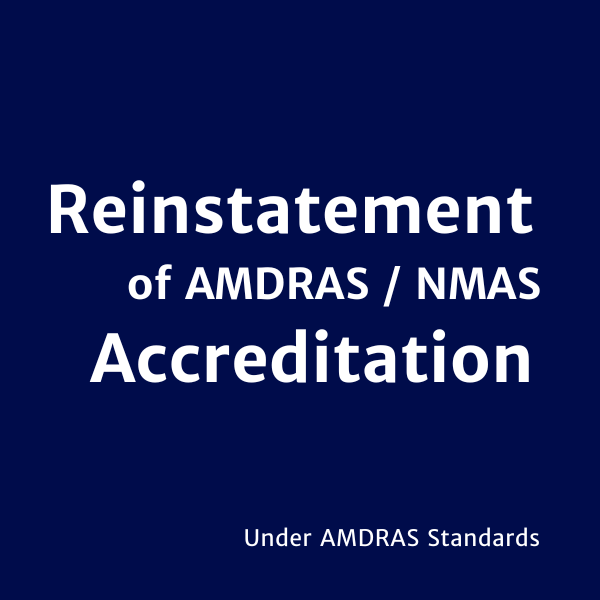
🌀 How to Reinstate Your National Accreditation as a Mediator
If your national mediator accreditation has lapsed or been suspended — don’t panic. Life happens! Whether you’ve taken a leave of absence, missed your CPD requirements, or let your renewal slip by, the Australian Mediator and Dispute Resolution Accreditation Standards (AMDRAS) provides a clear process for getting back on track.
Here’s what you need to know if you’re seeking to reinstated accreditation under Clause 57 of the AMDRAS Standards.
✅ Who Can Apply for Reinstatement?
You’re eligible to apply if:
You’ve taken an approved leave of absence, or
Your accreditation has been suspended, cancelled, or has lapsed (for example, because you didn’t complete the renewal process in time).
📄 What You’ll Need to Provide
To apply for reinstatement, you must submit the following to us (or your Recognised Accreditation Provider (RAP) if Mediation Institute is not your RAP) :
Proof that you currently meet all re-accreditation requirements, including:
Any conditions that were imposed when your accreditation was suspended, cancelled or during your leave.
Evidence of hours of mediation practice, if applicable.
Your original accreditation date (when you were first accredited under AMDRAS or the previous National Mediator Accreditation Standards).
Dates related to your leave, suspension, cancellation, or lapse.
A statement from your RAP explaining the reason for your suspension or cancellation (if it was not the RAP you are making the re-instatement application for).
📚 Missed CPD or Practice Hours? Here’s What Happens
If you haven’t met your or practice hours (20 hours) or CPD (Continuing Professional Development) (25 hours) requirements for the past 2-year period, you will be asked to complete:
Supplementary practical training
Additional coaching or supervision
Assessment activities to demonstrate competence
These requirements are there to help you refresh your skills and ensure you’re ready to resume accredited practice confidently and competently.
📆 When Will Your Accreditation Be Reinstated?
Your accreditation will be officially reinstated on the date we notify you in writing that all requirements have been met.
⚠️ Important Limitation: One Reinstatement Every 4 Years
You can only be reinstated once in any 4-year period. After that, if accreditation lapses again, you’ll need to go through a full initial accreditation process.
🌀 Never Been Nationally Accredited?
Which scenario applies to you?
Let’s help you figure out your next step toward becoming (or returning as) a nationally accredited mediator.
✋ I did mediation training but never applied for national accreditation.
👉 This post isn’t for you.
You may be eligible to apply via the Experience Qualified Pathway if you have been working as a mediator unaccredited and have at least two people who will provide references regarding your competence.
➡️ Read about the Experience Qualified Pathway
📘 I haven’t done any recognised training but I want to become a nationally accredited mediator.
To be nationally accredited for the first time, you must complete a course approved by the AMDRAS Board.
➡️ Learn about the Mediation Institute AMDRAS Certificate of Training Course
Need help working out your best pathway?
📧 Contact us – we’re happy to guide you!
Frequently Asked Questions
📚 Ongoing Professional Development Expectations
At Mediation Institute, we value lifelong learning and ongoing skills development—especially in sensitive and evolving practice areas like Family Dispute Resolution and Family Group Conferencing.
Family Dispute Resolution Practitioners (FDRPs)
FDRPs are required by the Attorney-General’s Department to meet specific Continuing Professional Development (CPD) standards to maintain their accreditation and registration. These requirements are essential for ensuring high standards of practice and ongoing professional growth.
🧩 Family Group Conference Facilitators
While there are no formal CPD requirements currently in place for Family Group Conference (FGC) Facilitators, we strongly encourage practitioners to adopt the same commitment to professional learning.
💡 Our recommendation:
Aim for a minimum of 1 hour of professional development per month—just 12 hours per year—to stay current, confident, and connected with best practices in your field.
This could include:
Attending workshops or webinars
Peer group discussions or supervision
Reading relevant articles or research
Participating in role-plays or skill refreshers
🗂 How Do I Keep Track of My Professional Development?
We’ve put together a simple guide to help you track your CPD activities.
➡️ How Do I Keep Track of My Professional Development?
You can now record your CPD and upload records in the MiMembers portal: www.mimembers.au
Keeping a record isn’t just good practice—it’s a great way to reflect on your growth and build confidence in your evolving skills.
Want help planning your CPD for the year?
Review the upcoming Free for Members events – make sure you log in to register for free – Events | Events
Reach out to us at members@mediationinstitute.edu.au—we’re here to support your development as a reflective, capable, and up-to-date practitioner.


